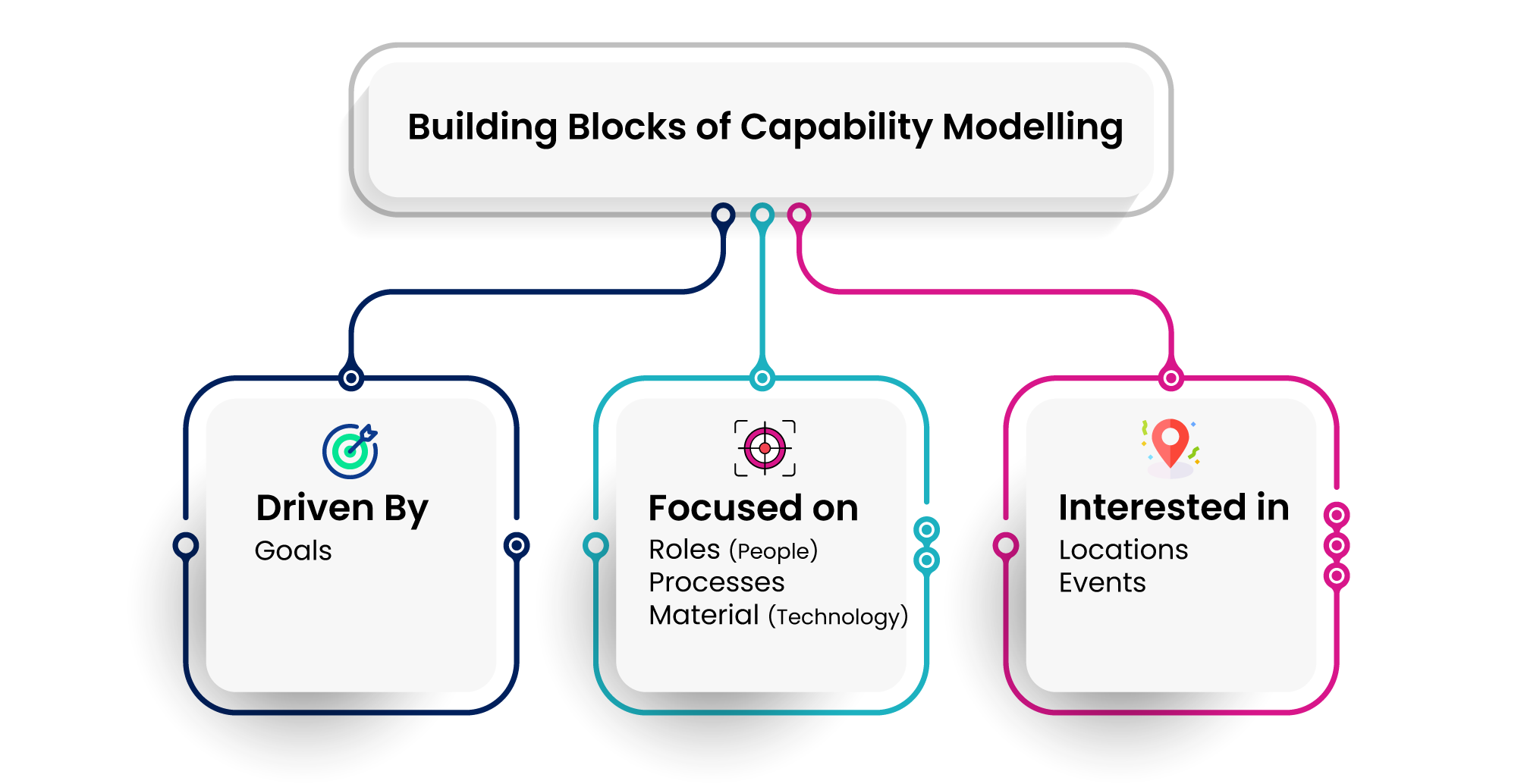Capability Modeling in Healthcare
January 15, 2024
Business Capabilities
At its core, a ‘business capability’ defines what an enterprise must do to achieve its strategic objectives. Such capabilities demonstrate the approach enterprises adopt to integrate resources, information, processes, competencies, and their surroundings to offer consistent value to their customers.
In other words, they define what an organization does and what it must do in response to strategic challenges and opportunities. It is critical to identify capabilities; however, it is equally important to deliver value since it highlights the relative significance of each capability.
In a nutshell, a business capability outlines ‘what’ an enterprise does to create value rather than ‘how’ it accomplishes it.
Business capabilities represent:
- Consistent business functions
- Are distinct and independent of each other
- Clearly defined business outcomes
Capability Modeling
Business Capability Modeling is a technique to represent the anchor model of an enterprise, irrespective of its structure, people, processes, or domains. In a continuously evolving business landscape, enterprises often encounter an unexpected gap between the high-level, directional nature of a strategy and its execution. This, in part, is due to a lack of clarity about the steps an enterprise should take to accomplish a goal. Business capability modeling is an effective technique that helps close the gap.
Business capability models help describe what a business does while focusing on the long-term vision of the enterprise. A business capability model plays an instrumental role in the identification of:
- Processes that are similar, overlapping, or redundant by nature
- Wasteful or non-value-added activities; and
- Major areas of impact in the event of a merger or business restructuring
The usefulness and relevance of a business capability model extend beyond the above benefits. Business capability models help enterprises think ‘outside the box,’ envision the future, and move forward on the path to transformation. These models may also be leveraged as strategic planning tools that help comprehend, analyze, and communicate enterprise-level developments.
Capability Modeling: The Healthcare Context
Capability modeling in healthcare involves the Identification, Definition, and Analysis of the capabilities essential for healthcare organizations to achieve their strategic goals and objectives. A capability is the ability of an organization to perform a particular function or activity at a specific level. Capability modeling helps healthcare organizations understand their current and desired future states, enabling them to align resources, processes, and technology to improve their overall performance and drive transformation.
Healthcare services cover a wide spectrum that encompasses outpatient healthcare service providers, such as primary care, diagnostic service providers, and mental health providers, as well as home health care. There is a significant opportunity to deploy technology more effectively to enhance patient care.
In the present scenario, the healthcare industry stands on the cusp of a transformation largely fueled by changes in customer expectations and global regulatory procedures, as well as rapid technological advancements. As customers continue to demand more transparency, personalization, and digital-first interactions, regulatory shifts like a focus on universal healthcare and enhanced privacy standards continue to transform business models. To adapt to business transformation, healthcare enterprises must make major strategic changes. However, to provide value to customers and stakeholders, healthcare service providers look for a unified and verified representation of their business capabilities that integrates activities, investments, and strategy.
The business capability model helps a healthcare enterprise gain complete visibility into its core, industry-specific areas and simultaneously acts as a business blueprint that performs various functions. In other words, it is an indispensable tool that business architects, technology executives, enterprise architects, and project teams seek to understand the complexities of the healthcare industry.
Case Studies: Exemplifying Capability Modeling in Healthcare
Case Study 1: Transitioning to a Unified Health Delivery Model Using Business Capability Modeling
Despite being one of the most technologically advanced healthcare organizations in the United States, the organization faced several challenges associated with the need to adapt to trends in the U.S. healthcare industry, which was undergoing significant changes involving competition, reduced costs, and new kinds of care and payment models. Consequently, the healthcare organization required a structured approach focused on changing business designs and IT systems.
Solution
Our team collaborated with the enterprise architecture (EA) group of the healthcare organization to spearhead an effort to launch a comprehensive business capability-modeling initiative that enabled a more unified health delivery model, better met evolving healthcare needs, and drove effective business and IT planning.
Impact
The new business capability model was utilized for:
- Cross-functional business planning
- Resource planning and resource sharing
- Facility design and department proximity planning
- Identification of relationships across key business elements
- Process workflow designs
- Program management support
- Communicating and planning for business technology requirements
The capability model also enabled the healthcare organization’s IT function to visualize future business to better support transformation.
Case Study 2: Utilizing Capability Model Through the Transformation Journey
A renowned, integrated healthcare services system headquartered in Minnesota was significantly impacted by the macro-dynamics of the healthcare industry, including an uncertain health policy, an industry shift from volume-based to value-based care, pressure to develop new revenue streams, and the ever-increasing need to personalize care.
The healthcare services system soon realized that it needed to change its business approach as well as its care model. Therefore, it required assistance to enable the much-needed shift in its value proposition, business capabilities, and profit model.
The healthcare services system had a capability framework, as part of which it was required to:
- Coordinate care
- Provide care to patients
- Operate its business
- Manage compliance and risks
- Manage ecosystem and partners
- Attract and develop talent.
Our team was quick to realize that the deployment and implementation of a new business capability model for the healthcare services system necessitated the development and acquisition of a few capabilities. However, it also required the removal of other additional capabilities. Simultaneously, the healthcare services system was under constant pressure and faced challenges amidst the need to optimize its existing and new capabilities, enhance its understanding of business within IT, clarify and extend its strategy and business model, as well as expand its Digital Care Platform.
Solution
We supported the healthcare services system with a business capability model, which helped them:
- Realize business benefits through optimization of existing and new capabilities
- Enhance its clinical and business engagements
- Deliver digital care through strategic planning and
- Successfully execute business strategy via capability-based architecture and roadmaps
Key Contributor: Geetanjali Negi, Senior Manager – Content/ Research & Sales Enablement




